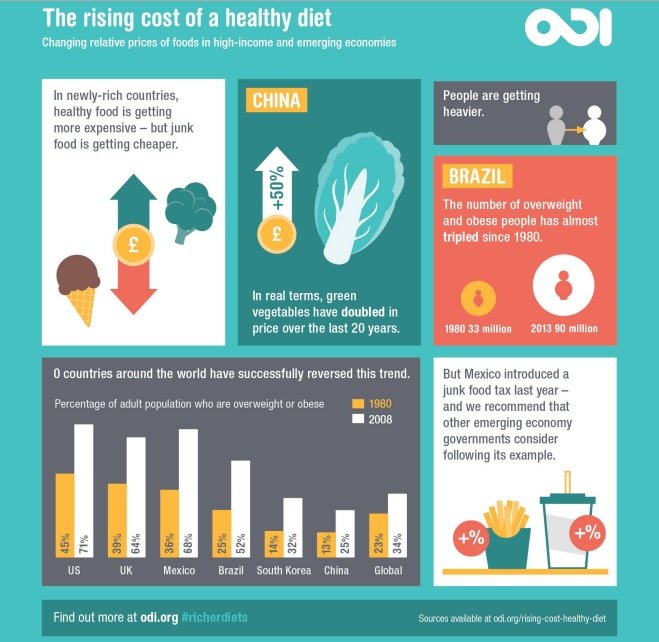Personally, I have a really sweet tooth. My parents may have suspected that I'd grow out of it once I hit my mid teens, but they were not correct on this one. So for me, I have to use a bit of willpower to maintain a reasonably healthy diet. Unfortunately, chocolate doesn't contain all of the nutrients I require, meaning that last night's chicken salad and this morning's banana were the right thing to do.
In many parts of the world, there's a similar but different challenge. How to eat a healthy diet on a very tight budget, even though healthy foods cost considerably more than fatty, packaged products. It's created a situation where poor people might not look skinny and gaunt like you might expect, but flabby and unwell. The cheapness of oily, vitamin-poor packets of food has made obesity a risk that isn't just faced by wealthy people.
The consequences of obesity stretch well beyond the need for (or capacity of) elasticised pants. Obesity increases the risk of diabetes, heart disease, certain cancers, and results in shorter life expectancies. Indeed, 65% of the world’s population now lives in countries where overweight is killing more people than underweight. Obesity has become a significant problem in middle and lower income countries, and is therefore a public health challenge in countries that are trying to lift people out of extreme poverty.
The Overseas Development Institute has recently released a great report into the rising cost of healthy food, and found that in high-income countries over the last 30 years it seems that the cost of healthy items in the diet has risen more than that of less healthy options, thereby encouraging diets that lead to excess weight. The same may apply in emerging economies, such as Brazil, China, Korea and Mexico, where prices of fruit and vegetables have been rising more than most other foods, including energy-dense processed foods.

What to do?
Michelle Obama has been a prominent voice in the United States for making nutritious foods more affordable, so that people on lower incomes were more able to make choices that could keep them healthy. The ODI report concludes that a strong case emerges for using taxes and subsidies to offset recent price rises in fresh food, in order to encourage more consumption of healthy foods and less of unhealthy items.
The rise expansion of obesity worldwide looms as a major health challenge in the 21st century, and governments will need to try a variety of different policies in an attempt to keep their people healthy and out of hospital. Another potential area for intervention is public health education. You and I might have had healthy diet messages drummed into us throughout childhood, but this sort of thing is often weaker in lower income countries, meaning that lots of people are lacking the knowledge to make balanced choices for their diet. There's work to do!